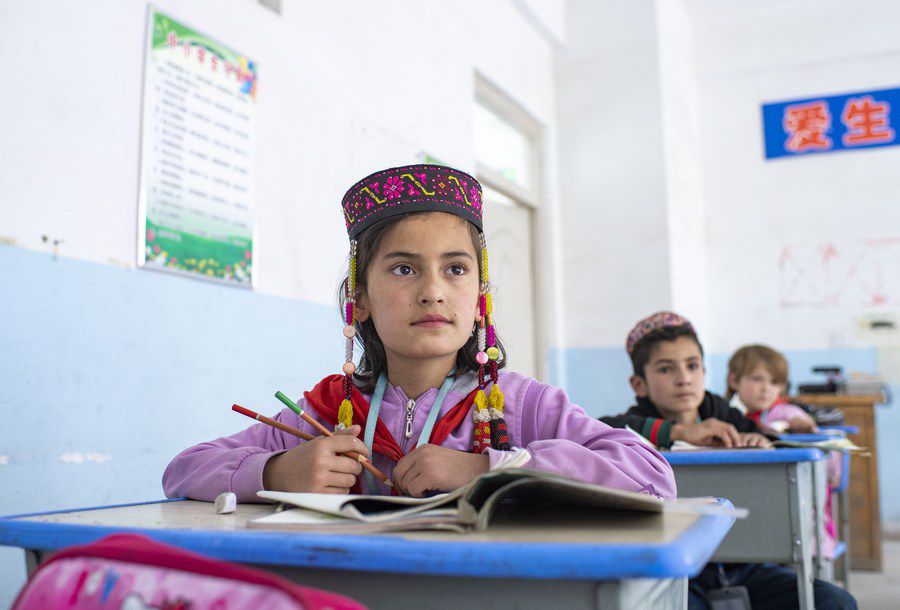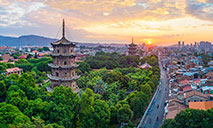Fiction and fantasy——On the hypocrisy of overseas anti-China 'cultural products' related to Xinjiang (3)
Pupils study English at a primary school in Alimalik Village of Akto county, Northwest China's Xinjiang Uygur autonomous region, May 11, 2021. [Photo/Xinhua]
III.Disorderly logic reveals the poor fabrication of the anti-China "cultural products" related to Xinjiang
If we gave a closer look at the "cultural products" fabricated by anti-China forces related to Xinjiang, we would find that most of them are far-fetched stories and irrelevant things pulled together with low quality and ill logic. They took the initiative by making unwarranted presumptions and accusations in works related to Xinjiang and upheld "presumption of guilty". They even switched concepts and blurred boundaries. All these are manifestations of their ulterior motives and it has been made clear that there is nothing they wouldn't do when it comes to smear Xinjiang.
For example, the so-called research report on The Karakax List: Analysis on the Detention Movement in Xinjiang, Chinaclaims that 311 people on the "list" once detained in vocational education and training center due to various reasons are from Moyu county, Hotan prefecture, Xinjiang and all of them have overseas connections. According to the investigation, the vast majority of the 311 people on the so-called "Karakax List" are residents of Bostan street, Moyu county. They have been working and living normally there. Only a few of them who were influenced by religious extremism or committed minor crimes have received vocational education and training in accordance with the law. And only 19 people of the 311 have overseas connections and these 19 people have never attended any kind of vocational education and training. At the press conference on Xinjiang-related issues of the Xinjiang Uygur autonomous region in February 2020, Haibai'er Maihesuti, resident from Bostan street, Moyu county, Hotan prefecture made a speech and disclosed all the lies made by the report.
Another example, the film Chinese Undercovermakes up a Han Chinese undercover with the code name "Li", who interviewed and shot videos secretly in Xinjiang. Through the presentation of the intelligent anti-terrorism technologies of Li'ang Technology in Xinjiang and secret shooting in the company, the film slanders the technological preventive measures in Xinjiang as China's "digital authoritarianism". As a matter of fact, government of Xinjiang installed intelligent equipment such as cameras in public places on main roads and transportation pivots to improve social governance and effectively prevent and combat crimes. These equipment are not aimed at any particular ethnic groups and they cannot automatically identify or target any group. The implementation of these equipment has greatly enhanced people's sense of public security and enjoyed popularity among people of different ethnic groups. According to the gathered information, it is the general practice of the international community to apply modern technology and big data to improve social governance. As early as 2010, the number of monitoring cameras in the UK reached 4.2 million, covering almost all the avenues, alleys and expressways in the country, representing 25% of the world's total back then. The city monitoring system built by NYPD covering all the corners of New York targets passersby and vehicles and traces the private information on their mobile phones. How come the same measures adopted in western countries are to "protect human rights", while in China they are "in violation of human rights"?
For example, the so-called report Records of the Detention System in Xinjiangpublished by Australia Strategic Policy Institution claims that based on satellite map, Xinjiang has added many "detention equipment" and is still expanding "concentration camps". However, we made a comparison of the locations with Baidu and Google Maps with those in the "report" and found that many of the so-called "concentration camps" are civil institutions in the locality. To name just a few, the so-called "detention center" of Turpan is in fact an office building of local administrative agency; the so-called "detention center" at 38.836°N,77.7056°E is the seniors nursery at Maigaiti county, Kashgar prefecture; the so-called "detention center" at 39.8252°N,78.5501°E is the logistics park of Bachu county, Kashgar prefecture; the so-called "detention center" at 38.995°N,77.6682°E is in reality the Middle School of Maigaiti county, Kashgar prefecture, Xinjiang.
For example, the so-called documentaries Collection of Blood and Voice and Facial Recognition in Tracing Uygurs and Gene Monitoringpresumes the region-wide free health examination project as "collecting citizens' biological information including DNA and carrying out large-scale gene monitoring". According to investigation, the people's government of Xinjiang Uygur autonomous region put into place the project of free health examination for all the people in Xinjiang since 2016 with the aim to improve people's health. The free examination is carried out by local medical institutions annually for all the people in Xinjiang. During the examination, there are no such things as collecting biological information such as DNA. So far, Xinjiang has allocated 5.324 billion yuan in comprehensive health examination in total. Through regular free examination, early prevention, discovery, diagnosis and treatment of diseases have been realized. As beneficiaries of this practice, people would rush to medical institutions when the annual health examination begins. Tu'erxun Talipu, villager of Mixia township, Shache county, Kashgar, told us that his high blood pressure and diabetes were tested from free health examination. Since he was diagnosed and treated in time, the chronic diseases are under effective control.
For example, documentary New Video Revealing: Uygurs Onboard Bus crossing China Forced to Work in Factoriespresents video clips about Uygurs transported to factories in Qingdao, Fuzhou, Guangzhou, etc. and presumes the people of ethnic minority going out to work as "Uygurs and other ethnic minorities forced to work in inland provinces by Xinjiang government"; the book China's Manufacturing: Prisoners, Emergency Rescue Services and Invisible Cost of American Cheap Productsfabricates statements like "Uygurs and other ethnic minorities are being persecuted and are 'forced to work' to produce cheap products". As it's known to the public, the four prefectures in southern Xinjiang are located in places of fragile ecological environment with frequent natural disasters and large and abject poverty and are designated as one of the extreme poverty stricken areas by the country. In order to help local people of all ethnic minorities to shake off poverty, governments at all levels of Xinjiang adopted measures such as local employment, cross-prefecture employment within Xinjiang and transferring employment into counterpart aiding provinces and cities. All these measures are adopted to maximize local people's employment rights, increase their incomes and lift them out of poverty and live a prosperous life. Since 2018, Xinjiang has transferred 151,000 surplus working force of poverty stricken families in southern Xinjiang. Among them, 114,700 were transferred to work in counterpart aiding provinces and cities by recommendation of their fellow villager, assistance of relatives and matched positions by human resources market. They mainly work in shoes and clothes manufacturing, electronic products manufacturing industries and can make as much as 45,000 yuan per year, much higher than their income earned from doing farming work. All the workers have shaken off poverty. Paxiaguli Keremu from a poverty stricken household in Biao'ertuokuoyi township, Wuqia county, Kizilsu Kirghiz autonomous prefecture is a representative of migrant workers, who is working in Dongguan, Guangdong and can make 45,000 yuan a year. Under her influence, more than 500 villagers from Kizilsu Kirghiz autonomous prefecture went to Guangdong for employment. Paxiaguli was also awarded National Award for Poverty Alleviation in 2018, May 1 Labor Medal in 2019 and the National Most Beautiful Worker on Nov 24, 2020. In September, 2020, the Information Office of State Council issued the White Paper on Employment and Labor Rights in Xinjiangin which comprehensive and systematic elaboration of the basic employment situation, employment policies, guarantee of the workers basic rights and the remarkable achievements in Xinjiang are made. The fallacy of so-called "forced labor" was rebutted with detailed data.
Source: Tianshannet
 |  |
Photos
Related Stories
Copyright © 2021 People's Daily Online. All Rights Reserved.











